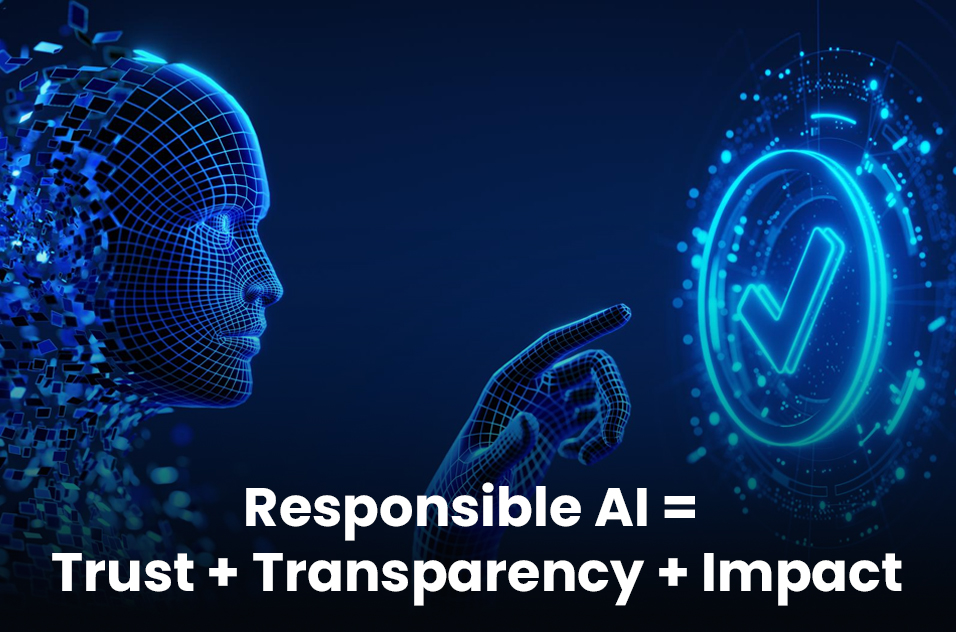
Organizations today face growing expectations from customers, regulators, and even employees – to ensure that their AI solutions do not reinforce bias, misuse data, or create unintended harm. Responsible AI is about embedding ethics, fairness, and accountability into every stage of AI development and deployment. In simple terms, it’s not just about how powerful AI can be, but how responsibly it’s applied to real-world problems.
Let’s look into the core of Responsible AI: what it means, why it matters, and how organizations can put it into practice.
Responsible AI refers to the practice of creating and deploying artificial intelligence in a way that is ethical, fair, transparent, and accountable. It ensures AI technologies respect human rights, avoid biases, and are used responsibly.
In practice, Responsible AI also involves cross-functional collaboration between developers, ethicists, and business leaders to align technology outcomes with organizational values. It’s not only a technical framework but also a cultural commitment that shapes how AI solutions are envisioned and deployed.
This ensures that AI development doesn’t just focus on performance but also on trust and inclusivity.
Responsible AI is crucial because it helps businesses build trust, stay compliant, and avoid reputational or legal risks. Beyond compliance, it enables innovation in ways that align with societal values.
For organizations, adopting Responsible AI is also a differentiator in crowded markets. Businesses that can prove ethical AI use often secure better partnerships, attract top talent, and build stronger customer loyalty. It creates a foundation where innovation and responsibility go hand in hand, ensuring AI-driven growth is sustainable.
Responsible AI works by applying ethical principles and governance frameworks across the entire AI lifecycle. From data collection to deployment, each stage requires oversight.
Organizations often set up dedicated AI governance boards to review new AI solutions before launch. These boards evaluate risks, fairness tests, and ensure compliance with ethical guidelines. Continuous monitoring is also essential, as AI models evolve with new data and may unintentionally drift into bias or error if left unchecked.
For example, a healthcare company using AI for diagnosis must explain how results are derived, ensure fairness across demographics, and maintain strict data privacy, demonstrating responsible AI development in action.
Responsible AI creates value across ethical, business, and operational dimensions. Organizations that adopt it gain both trust and a competitive advantage.
Another benefit is improved decision-making quality. By ensuring data accuracy and transparency, Responsible AI leads to more reliable insights for strategy and operations. It also boosts internal culture, employees are more motivated to work with organizations that prioritize ethics in AI solutions.
When companies embed responsible practices into AI development, they ensure their AI solutions meet not only technical but also ethical expectations.
Organizations can adopt Responsible AI by embedding governance, policies, and monitoring systems into AI workflows. It’s about balancing innovation with responsibility.
In addition, companies should invest in explainable AI tools and bias-detection frameworks. These technologies make it easier to identify hidden risks before deployment. Employee training is equally critical; when teams understand ethical AI principles, they are more equipped to design and monitor solutions responsibly.
For instance, financial institutions adopting AI for credit scoring must ensure their systems are free from discrimination, comply with financial regulations, and remain transparent to customers.
The biggest challenges with Responsible AI include handling bias, ensuring transparency, and keeping up with global regulations. While important, these can be complex to manage.
However, proactive organizations using trusted AI development methods can overcome these barriers. For example, employing fairness audits, explainable AI tools, and multidisciplinary governance teams ensures smoother adoption.
Responsible AI is not just a best practice; it’s a strategic requirement for modern enterprises. It ensures ethical use of AI, strengthens trust, and protects organizations from risks. It’s about designing AI solutions that are powerful yet ethical, ensuring technology serves people, not the other way around. Companies that adopt Responsible AI today will be tomorrow’s leaders in a world increasingly shaped by artificial intelligence.
Zoondia empowers enterprises with Responsible AI solutions tailored to ethical standards and business needs. Our experts help organizations harness AI responsibly to drive trust, growth, and lasting impact.
What industries benefit most from Responsible AI?
Mainly healthcare, finance, hiring, and education, where AI impacts people directly. But in truth, every industry benefits from fair and trustworthy AI.
Can Responsible AI slow down innovation?
No. It may add some checks, but it actually supports safer, long-term innovation by building trust, reducing risks, and ensuring compliance.
What needs to be done to adopt Responsible AI in an organization?
Companies should set ethical guidelines, use quality data, train teams, add human oversight, and monitor AI regularly to keep systems fair and transparent.
How does Zoondia ensure AI stays responsible after launch?
We provide ongoing monitoring and support, making sure AI systems remain fair, secure, and reliable over time.
How is Responsible AI different from traditional AI development?
Traditional AI focuses on speed and performance, while Responsible AI adds ethics, fairness, and transparency to prevent harm.
By continuing to use the website, you agree to our Cookie Policy. To learn more about how we process your personal data, read our Privacy Policy
